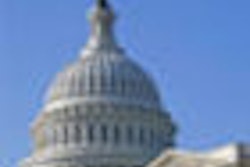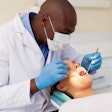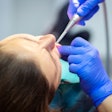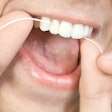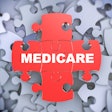
Despite all the jawboning about healthcare reform in Washington, DC, these days, politicians have said very little about teeth. That shouldn't surprise anyone. Dentistry has resided outside the main body of U.S. healthcare almost as long as there have been doctors. But now that's starting to change.
|
Oral Health Action Partnership The coalition includes the following organizations:
|
Perhaps for the first time, the dominant oral health organizations are seeking a larger government role in dentistry. And in response, members of Congress have reportedly gone as far as proposing a dental benefit in Medicare.
"The bottom line is that oral health is critical to general health and that oral health should be included as an element of general health reform," said Caswell Evans, D.D.S., M.P.H., who heads the Oral Health Action Partnership, a coalition of the 12 largest U.S. oral health organizations (see sidebar).
So far the coalition hasn't agreed on any specifics.
And a split is emerging between those groups who think healthcare reform should include dental insurance for everyone and those who aren't so sure. Still, the fact that so many organizations want dentistry to be included in healthcare reform is remarkable in itself.
Under the radar
Dentists successfully lobbied to be excluded from Medicare when it was founded in the 1960s. Even as recently as 15 years ago, many of these organizations had little taste for the process. "Under [President Bill] Clinton, there were dedicated efforts to keep dentistry out of the debate," said Dr. Evans, a University of Illinois at Chicago College of Dentistry associate dean and a driving force behind the 2000 Office of the Surgeon General's "Oral Health in America" report.
Lots of dentists cherish their independence. "Let's make sure we FLY UNDER THE RADAR of that entity we call the federal government for as long as possible!" wrote one dentist, posting on a DrBicuspid.com forum. "Look what they have done to medicine and their insurance policies."
So what has changed? For one thing, recent research has linked periodontitis to cancer, heart disease, diabetes, and other sometimes fatal diseases, prompting a growing emphasis on the importance of oral healthcare in sustaining systemic health.
Surgeon General David Satcher in 2000 called attention to disparities in oral care, pointing out among other facts that 2.5 times as many people lack dental insurance as lack medical insurance.
News reports have focused on such dramatic images as patients lining up the night before a clinic offers a day of free dental services. And nothing has changed attitudes about dental care more than the case of Deamonte Driver, the Maryland 12-year-old who died of an abscess in 2007 after his mother couldn't find a dentist who accepted Medicaid. "Boom Time for Dentists, But Not for Teeth," read a headline in the New York Times, pointing an accusing finger at dentists' rising incomes.
So nearly all the oral health organizations agree that the federal government has to get more involved in fixing these problems. They just haven't come together on how far the fixing should go.
Neediest first
The ADA wants the government to focus on the poorest -- what William Prentice, director of the organization's Washington, DC, office, calls "fixing the tattered safety net."
High on the ADA's agenda are an increase in Medicaid reimbursement and mandatory dental benefits for adults on Medicaid. Many states have never offered adult dental coverage through Medicaid, and others cancel it in tough times -- as several states are poised to do now.
The ADA also wants the federal government to invest more in rural health centers and programs such as the National Health Service Corps that bring dentists to areas where they are scarce. It would like the feds to help provide more preventive programs, such as sealants and fluoride, and to increase oral health awareness through school curricula and public service announcements.
Many other organizations, such as the Academy of General Dentistry, the Association of State and Territorial Dental Directors, and the National Association of Dental Plans have outlined similar priorities in their policy statements.
What these statements don't address is the $48 billion question in healthcare reform: How to help people who can't afford their own insurance but still make too much money to qualify for Medicaid?
Prentice argues that most dental care is relatively affordable. "If someone can't get the dental care they need, that's a problem that needs to be addressed," he said. "It's something we need to think about. But as a first step, it's important to focus on those in most need."
Already the ADA has identified an approach it doesn't want to see: dental benefits in Medicare. The organization wrote to Sen. Jeff Bingaman (D-NM), who is working on a healthcare reform package, to disapprove the idea after reading a draft of a bill the senator was writing, Prentice said. (Queried by DrBicuspid.com, the senator's office declined to comment.)
"Fundamentally, it is a matter of asking government to use its limited resources in a manner that serves those with the least first, and Medicaid -- not Medicare -- is where those limited resources are needed most," Prentice told DrBicuspid.com in an e-mail.
The ADA isn't necessarily opposed to seeing dental insurance included in some other sort of public program, but would reserve comment until specific legislation emerges, Prentice said.
Meanwhile, a few other organizations have indicated what they don't want to see. In its policy statement, Delta Dental opposes "any system that erodes existing, comprehensive dental benefit programs already in place in the group benefits market" and "any system that eliminates the role of third-party administrators by establishing a single-payor, government-sponsored program."
For one and all
Others, meanwhile, are pushing unequivocally to cover everyone. "What a number of us want is universal health insurance that does include a dental package," said Frank Catalanotto, D.M.D., a University of Florida College of Dentistry professor who is chair of the Legislative Committee of Oral Health America and a member of the American Dental Education Association Legislative Advisory Committee. "It should be part of the package."
How would dentists be compensated? "However the medical is paid for," Dr. Catalanotto said. "I would assume a combination of individual and employer, and the government would pay for those who can't pay for themselves."
Hardly anyone, including Dr. Catalanotto, is getting much more specific than that. "It's not the oral health community's place to say how it gets done," said Jack Bresch, the ADEA's head of legislative policy development. Oral health, after all, accounts for only 5¢ of the U.S. healthcare dollar.
So instead, oral health organizations are focusing most of their efforts on reminding members of Congress to include oral health -- in some form -- as they come up with a plan.
For now, the shape of that overarching plan remains unclear. But a few broad outlines are starting to emerge as Congress mulls what's politically feasible, said Burton Edelstein, D.D.S., M.P.H., a Columbia University College of Dental Medicine professor and founder of the Children's Dental Health Project. He said members of Congress have settled on the following criteria:
- Keep it simple, because Hillary Clinton ran into so much trouble when she proposed a complicated healthcare reform plan in the 1990s.
- Build on what people already have, so they don't feel like they're giving anything up.
- Leave details to individuals and organizations that administer the benefits.
- Get support from pharmaceutical companies and insurance companies who scuttled the Clinton plan.
- Parcel out the bills to a variety of committees rather than tackling one comprehensive piece of legislation.
Given that strategy, Dr. Edelstein thinks the change in oral healthcare coverage will come in slow increments, such as the Children's Health Insurance Program (CHIP) and other state-run programs. "Overall, I don't think we're going to see any dramatic change," he said.
Congress may finally be putting teeth in healthcare reform, but it's chewing mighty carefully.
Copyright © 2009 DrBicuspid.com




